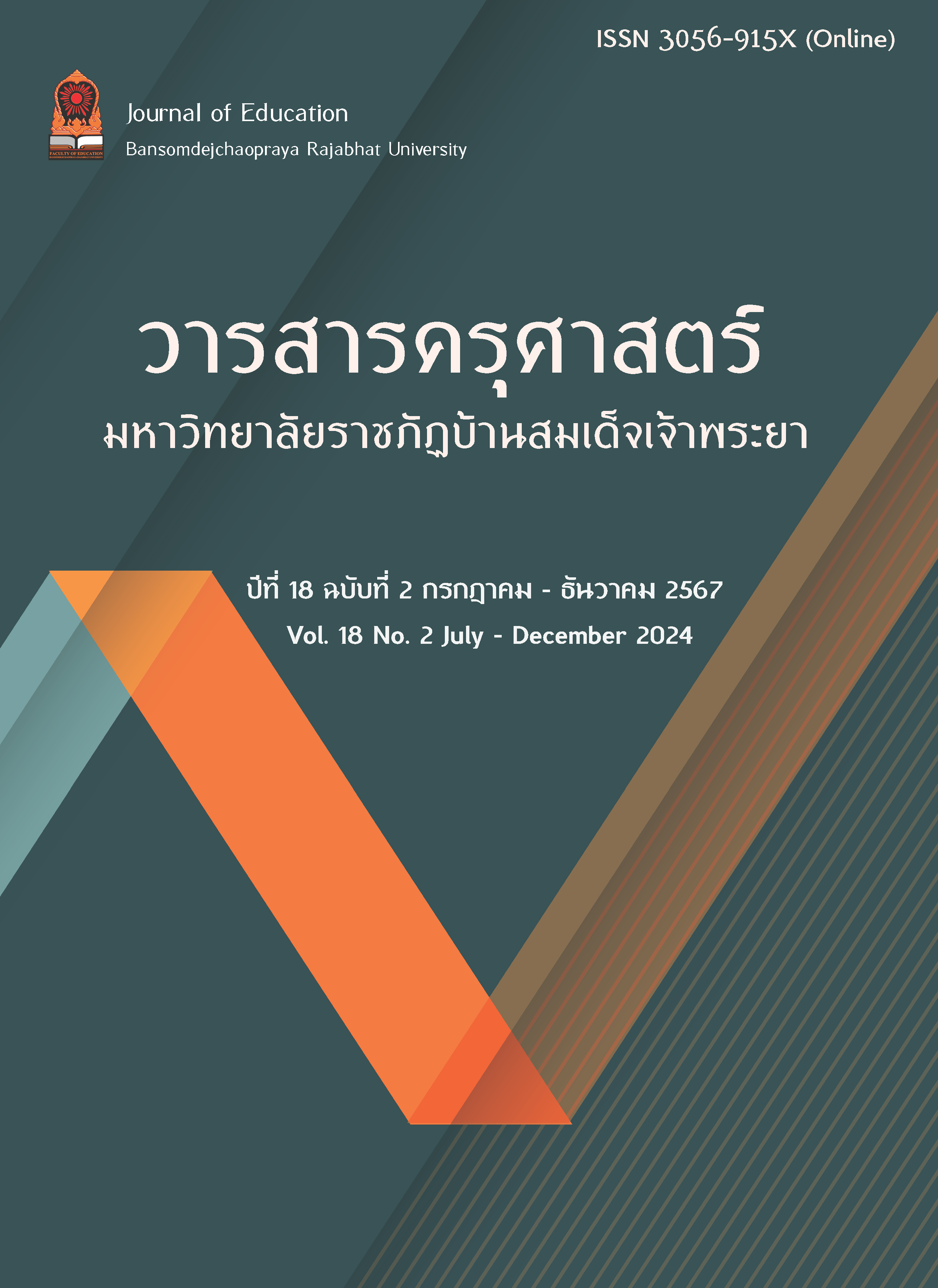Proactive Learning Management: Educational Pathways to Quality for Developing 21st Century Skills.
Keywords:
Proactive learning management, educational pathways to quality, 21st-century skillsAbstract
This academic article aims to present the principles and practices of proactive learning management, a strategy designed to create meaningful and effective learning experiences within the context of 21st-century education. The article begins by emphasizing the importance of proactive learning management in an era of rapid educational transformation. It highlights proactive learning as a critical factor for individual and societal development in the technological age, fostering essential 21st-century skills and enhancing learner engagement. Adapting Thailand's education system to align with national educational policies is essential to ensure equitable access to quality education. The article is divided into two parts: 1) Proactive Learning Management for Quality Classrooms in the 21st Century and 2) Integrating Proactive Learning to Develop 21st-Century Skills. These sections encompass processes that can be applied through critical thinking, analysis, and practical implementation to create quality classrooms. This approach benefits both educators and learners by equipping them with the necessary skills for the 21st century.
Proactive learning management for quality classrooms in the 21st century is reflected through four key strategies: 1) active participation through various activities, 2) experiential learning that bridges theory and practice, 3) the development of critical thinking skills, and 4) creating a conducive learning environment. Furthermore, integrating proactive learning to enhance 21st-century skills applies the 3R x 7C framework to foster learners' cognitive and emotional skills. The learning management approach includes methods of assessment, outputs, and outcomes through five formats: 1) activity-based learning, 2) experiential learning, 3) problem-based learning, 4) inquiry-based learning, and 5) process-oriented thinking skills. Thus, proactive learning management serves as a pathway to quality education in the 21st century, equipping learners with essential, modern skills to adapt and continue learning effectively. This approach fosters high-quality learners capable of competing and thriving in an ever-changing society.
Downloads
References
ทิศนา แขมมณี (2565). การใช้การเรียนรู้เชิงรุกในระบบการศึกษาไทย. วารสารการศึกษาวิจัย, 15(3), 98-112.
ทิศนา แขมมณี (2565). การเรียนรู้เชิงกิจกรรม: สร้างทักษะการคิดวิเคราะห์ในยุค 4.0. วารสารการศึกษาและการพัฒนามนุษย์, 10(1), 45-58.
พระราชบัญญัติการศึกษาแห่งชาติ พ.ศ. 2542 และแก้ไขเพิ่มเติม (พ.ศ. 2562). (2562). ราชกิจจานุเบกษา, 136(50 ง), 1-30.
พิมพันธ์ เดชะคุปต์. (2560). การเรียนรู้เชิงรุกแบบรวมพลังกับ PLC เพื่อการพัฒนา. กรุงเทพฯ: โรงพิมพ์ แห่งจุฬาลงกรณ์มหาวิทยาลัย.
Baker, J. A., & Garrison, D. R. (2020). Creating a Culture of Active Learning: Practical Strategies for Higher Education. International Journal of Teaching and Learning in Higher Education, 32(2), 276-287.
Barrow, H. S. (2019). Problem-Based Learning in Education for the Health Professions. Springfield, IL: Southern Illinois University.
Barrow, M. (2020). The Impact of Active Learning Strategies on Student Engagement and Learning Outcomes in Higher Education. Higher Education Research & Development, 39(4), 723-736.
Boud, D., & Walker, D. (2022). Promoting Reflection in Professional Courses: The Role of Experiential Learning. Higher Education, 83(4), 733-750.
Dewey, J. (2022). Experience and Education. Touchstone.
Freeman, S., Eddy, S. L., McDonough, M., Smith, M. K., Wenderoth, M. P., & Crowe, A. (2014). Active Learning Increases Student Performance in Science, Engineering, and Mathematics. Proceedings of the National Academy of Sciences, 111(23), 8410-8415.
Furtak, E. M., & Toth, E. (2020). A Conceptual Framework for Inquiry-Based Learning in Science Education. Journal of Research in Science Teaching, 57(2), 166-189.
Garrison, D. R., & Akyol, Z. (2020). Understanding Collaborative Learning in a Networked Environment. International Review of Research in Open and Distributed Learning, 21(4), 14-34.
Gulley, L. (2019). Strategies for Implementing Active Learning in STEM Education. Journal of STEM Education Research, 10(2), 1-16.
Hattie, J., & Donoghue, G. (2016). Learning Strategies: A Synthesis of Over 800 Meta-Analyses Relating to Achievement. Houghton Mifflin Harcourt.
Hung, W. (2021). Problem-Based Learning: A Review of the Research. Education Research International, 2021, Article ID 4624782.
Jacobs, J. (2022). Curriculum 21: Designing Curriculum for the 21st Century. Journal of Curriculum Studies, 54(1), 1-14.
Kolb, D. A. (2020). Experiential Learning: Experience as the Source of Learning and Development. Pearson.
Mayer, R. E. (2023). Learning strategies: A cognitive approach. Educational Psychology Review, 35(2), 345-370.
McGuinness, C. (2018). The Importance of Experiential Learning in Higher Education. Teaching in Higher Education, 23(5), 523-534.
McMahon, T., Haggis, T., & Evans, C. (2021). Adapting Teaching Strategies for Digital Learning Environments. Journal of Higher Education Teaching and Learning, 8(2), 120-135.
Meyer, K. A., et al. (2021). Technology as a facilitator of active learning in higher education: A systematic review. Journal of Higher Education Research, 45(2), 145-162.
Nguyen, H. T., & Hsiao, Y. (2021). Active Learning in Higher Education: Improving Critical Thinking Skills. International Journal of Teaching and Learning in Higher Education, 33(2), 189-201.
Raelin, J. A. (2021). The Role of Reflection in Experiential Learning: Lessons from Leadership Education. Academy of Management Learning & Education, 20(3), 311-325.
Savin-Baden, M. (2020). Problem-Based Learning in Higher Education: How to Plan, Implement, and Evaluate. Journal of Higher Education Policy and Management, 42(1), 31-45.
Schmidt, H. G. (2018). Problem-Based Learning: What Is It and How Does It Work? Clinical Teacher, 15(3), 200-206.
Smith, C., & Gyllenhaal, K. (2022). The Role of Inquiry in Science Education: A Framework for Teaching and Learning. Science Education, 106(1), 32-55.
Terenzini, M. A. (2021). Active Learning and Its Impact on Student Success in Higher Education. Journal of College Student Development, 62(1), 1-14.
Downloads
Published
How to Cite
Issue
Section
License
Copyright (c) 2024 Faculty of Educaion Bansomdejchaopraya Rajabhat University

This work is licensed under a Creative Commons Attribution-NonCommercial-NoDerivatives 4.0 International License.
บทความที่ได้รับการตีพิมพ์เป็นลิขสิทธิ์ของคณะครุศาสตร์ มหาวิทยาลัยราชภัฏบ้านสมเด็จเจ้าพระยา
ข้อความที่ปรากฏในบทความแต่ละเรื่องในวารสารวิชาการเล่มนี้เป็นความคิดเห็นส่วนตัวของผู้เขียนแต่ละท่านไม่เกี่ยวข้องกับมหาวิทยาลัยราชภัฏบ้านสมเด็จเจ้าพระยา และคณาจารย์ท่านอื่นๆในมหาวิทยาลัยฯ แต่อย่างใด ความรับผิดชอบองค์ประกอบทั้งหมดของบทความแต่ละเรื่องเป็นของผู้เขียนแต่ละท่าน หากมีความผิดพลาดใดๆ ผู้เขียนแต่ละท่านจะรับผิดชอบบทความของตนเอง



